

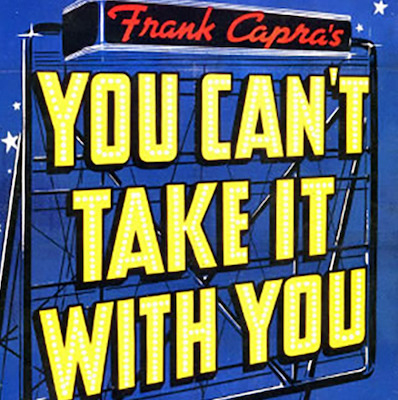
There's a story director Frank Capra tells in his 1971 memoir The Name Above the Title that reinforces his abiding public image – Hollywood's greatest patriot; the man who did more to restore America's faith in its founders' vision than any newspaper editorial or fireside talk. He's begun pre-production on Mr. Smith Goes to Washington and is being given a tour of the Capitol building by Jim Preston, the superintendent of the Senate press gallery.
He opens the door to the press gallery to give the director his first view of the chamber. "I'm a silly goose about things patriotic," Capra recalls, "so it was a natural – I got a bad case of goose pimples. There it was, spread out below me, as silent and awe-inspiring as an empty cathedral – the Senate! Right in front of us was the Senate clock. We could touch it. Beneath the clock, the Vice President's dais, and fanning out from the dais, the ninety-six desks."
Capra's patriotism, so unselfconscious and unironic, is something I admire about the man and his films despite my inability – grown vast and wide over the decades – to share it. It was this idealism that first attracted me to his pictures, long before I could name any of his peers in the golden age of the Hollywood studio system. And it's that idealism that makes it so hard for me to watch most of his universally acknowledged classic films today – with one notable exception.
Frank Capra made You Can't Take It with You in the middle of a nearly perfect winning streak of pictures that began with Lady for a Day in 1933, broken only by the high profile, big budget failure of Lost Horizon the year before he began work on his adaptation of a Pulitzer-winning Moss Hart and George S. Kaufman play.
He was the king of the Columbia lot – the director who elevated Harry Cohn's Poverty Row studio into a Hollywood contender, and one of the first directors to become a brand, with his "name above the title" – an auteur alongside Ford, Hawks, Lubitsch, Borzage and Welles. Capra navigated the transition to talkies, the restrictions of the Production Code and the social turmoil of the Depression arguably better than any other director in Hollywood at the time.
Cohn was among the least scrupulous of the studio moguls, and when he put Capra's name above the title of a b-picture Columbia released in the UK, Capra sued and had a showdown with Cohn in his home, forcing the studio head's hand in the face of a boardroom revolt. Cohn had angrily rejected Capra's request to buy the rights to the Hart and Kaufman play earlier, but the threat of losing his job and his studio changed his mind, and Cohn ended up paying a record $200,000 for the story.
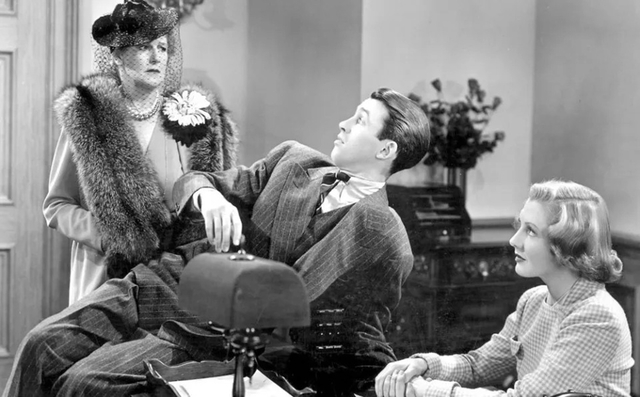
You would think (and you'd be right) while watching the first few minutes of Capra's film that it was the story of the Kirby family – particularly Anthony P. Kirby (Edward Arnold) a big shot New York banker who has just returned from Washington DC, where he has set up a sweetheart deal that will put him at the head of a monopoly in munitions, anticipating a seller's market in arms as the world descends into conflict. His only obstacle is Ramsey, a onetime friend and competitor, and he intends to drive him out of business by buying up all the property around his factory, preventing him from expanding to fulfill future orders.
Kirby has a son, Tony (James Stewart), who has been given a title – vice-president – and an office with a pretty secretary, Alice (Jean Arthur), with whom he has fallen in love. He's made of very different stuff than his father – a dreamer, more than a bit spoiled – and he pays very little attention to his father's deals, like the one around Ramsey's factory, which is being held up by a single family and its patriarch, "Grandpa" Martin Vanderhof (Lionel Barrymore) who refuses to sell.
But Alice is Vanderhof's granddaughter, the sanest member of a family of eccentrics that includes her mother Penny (Spring Byington), who writes terrible plays, her father Paul (Samuel S. Hinds) who makes fireworks in the basement, and her ballet-mad sister Essie (Ann Miller, only fifteen when she made the picture). The big old house is a kind of commune that the family shares with Essie's husband Ed (Dub Taylor), their former iceman DePinna (Halliwell Hobbes), their maid Rheba (Lillian Yarbo) and her boyfriend Donald (Eddie "Rochester" Anderson).
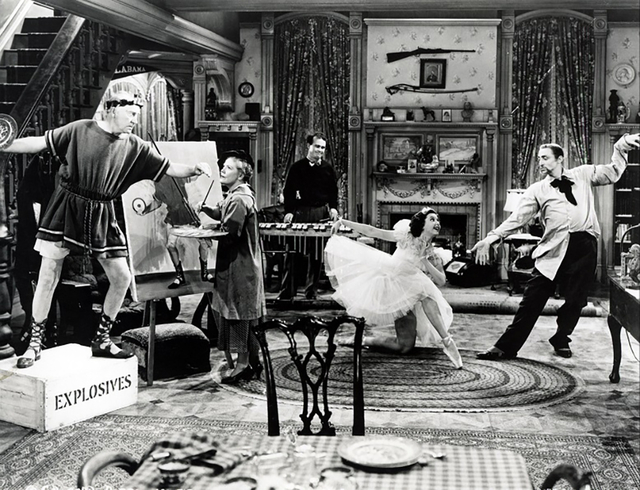
During a visit to the office of Blakely (Clarence Wilson), Kirby's vulturine real estate agent, Grandpa ends up collecting Poppins (the suitably-named Donald Meek), a timid bookkeeper with a passion for making mechanical toys, adding him to the extended family. Another frequent visitor is Kolenkhov (Mischa Auer), Essie's White Russian ballet teacher, who's unimpressed with her talent ("Confidentially, she steenks.") but eager for a seat at their dinner table.
We know in a moment that the clash between the snooty Kirbys and Alice's madcap clan will be the whole story of the picture, but Capra and Robert Riskin, his regular screenwriting collaborator, tease it out quite a bit further than the single-set stage comedy of Kaufman and Hart's play. Capra described the Vanderhof household as "a "heterogenous group of 'happies'" who "found the courage to do what most American secretly wished they could do: Consign to oblivion the hammer blows of crisis headlines – depression, wars, Hitler, Stalin – and more important to escape from the modern rat-race which pressured the average American into a lifetime of accumulating wealth and living standards he could never take with him."
They were "a happy-go-lucky family of rebels... living in perfect concord, finding happiness in individual expression: doing the things they had always wanted to do, even though they did them badly."
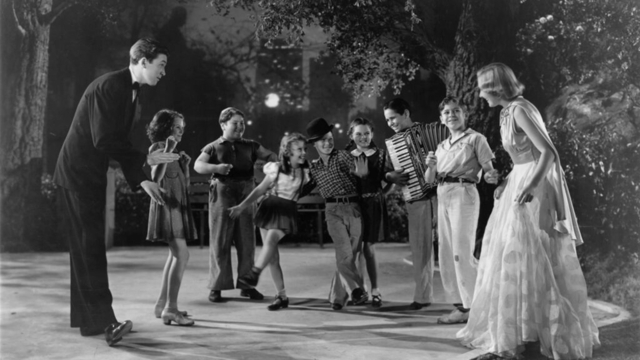
Tony is utterly charmed by Alice's family when he meets them and confesses to Alice that he wishes he had the courage to pursue his own path instead of filling an office at his father's bank. He takes her to see the Monte Carlo Ballet ("They steenk," says Kolenkhov) but detours her to Central Park, where he describes an idea he and a college buddy once had for making machines that mimic the way plants create energy from sunlight – solar energy, before the technology would be pioneered a decade later.
A bunch of kids hustle them for a dime to teach Tony and Alice how to dance the Big Apple, before a beat cop scatters everyone out of the park and the couple go on to dinner at the kind of black-tie establishment where his family dine with aristocrats. Capra had a big hand in creating the screwball comedy with It Happened One Night, but his take on the genre was usually less anarchic than films like Bringing Up Baby, Duck Soup, The Awful Truth or The Palm Beach Story. (Though he cut loose a bit more with Arsenic and Old Lace, tossed off in a few weeks while Capra was waiting for his commission in the Army Signal Corps.)
There is, however, a nice scene with Tony telling Alice that his parents are "putty in my hands" – that all he's ever had to do is scream to get what he wants. He warns her that he has a scream building up right now, panicking as he describes it climbing from his stomach to his throat, gripping his neck to try to stop it and provoking a frightened shriek from Arthur. When the maître d rushes over to ask what's wrong Tony claims that Alice was frightened by a rat, setting off a panic among the diners while they calmly make their exit. Stewart could rival Cary Grant with the chemistry he had with co-stars, but the rapport with Arthur here and in Mr. Smith was a wonder.
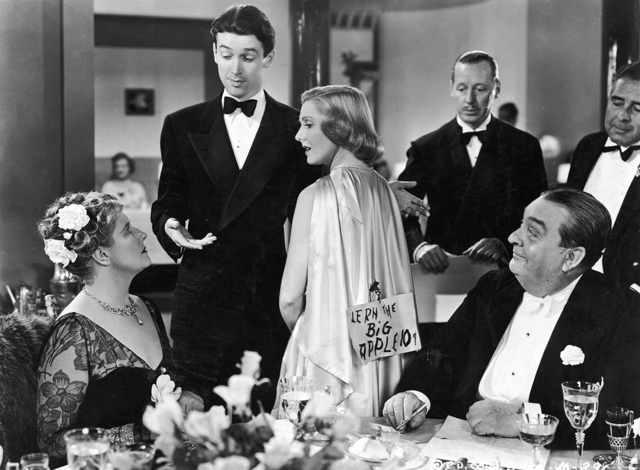
Capra and Riskin made crucial changes to the original play; in his memoir Capra says that they "threw out the play's third act, reduced the Tony-Alice love plot to 'counterpoint' and elevated the philosophical conflict between the lamb (Grandpa Vanderhof) and the lion (Kirby Sr.) to the 'point' of the story. The 'new' plot was, in reality, a love triangle with Kirby's son at the apex, and the lion and the lamb at the other two angles."
Capra's book is a masterpiece of self-promotion so it's hard to know just how much of this analysis was made in hindsight, but Capra said that he "combined the villain and the hero; changed Kirby Sr. – the play's two-dimensional, cardboard bad guy – into the film's villain-hero."
"Villains," he wrote, "are often more sympathetic than heroes; why the biblical father rejoiced and killed the fatted calf to celebrate the return of his prodigal son, much to the annoyance of the 'square' brother who had never wandered; why the shepherd loved the one lost sheep he found and saved more than the ninety-nine that had not strayed."
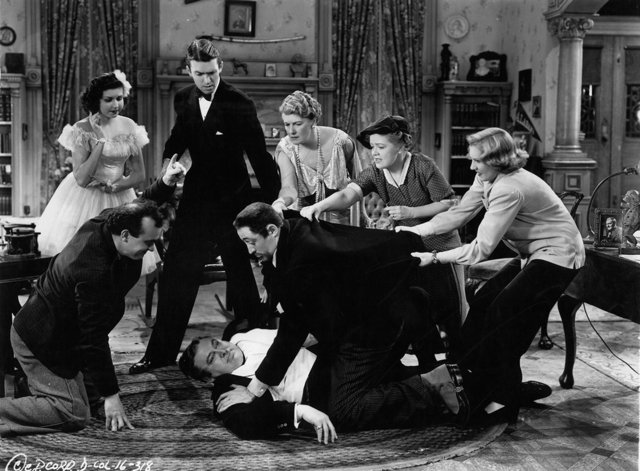
The apex of the story is a misbegotten attempt to introduce the two families, with Tony intentionally getting his parents to arrive on the wrong night so Alice can't stage manage a more acceptable but less honest version of her family that might pass muster with Tony's dour father and haughty mother. The house is a whirlwind of oddball activity when they arrive, and despite the best efforts of Alice her mother calls Mrs. Kirby's passion for spiritualism "bunk" and Kirby Sr. is wrestled to the ground by Kolenkhov, but before they can make an exit, a posse of lawmen arrive, tipped off by Blakely, looking for evidence that the family are a radical cell agitating for revolution.
The illegal fireworks factory in the basement had decided to make the Russian Revolution the theme of their annual fireworks show, and to that end they've been flooding the neighbourhood with leaflets printed by Ed, warning to "Watch for the Revolution" and that "The Red Flag will sweep the country". In the original play, Ed was even more of a simpleton, printing leaflets with random phrases that caught his ear, including demands to dynamite the Senate, the White House and the Supreme Court alongside a declaration that "GOD IS THE STATE, THE STATE IS GOD".
When Alice's father's pipe sets off the fireworks in the basement the whole house empties into the street and into waiting paddy wagons that haul them to jail. They're dragged into the night court where the Judge (Harry Davenport) is an early draft of the kindly President of the Senate played by Harry Carey in Mr. Smith. Grandpa is fined for the illegal fireworks factory but his neighbours, who have filled the courtroom, take a collection; the Kirbys try to get away without charges or the attention of the press but it all goes badly from there. Alice is enraged by Mrs. Kirby's snobbery and breaks up with Tony, fleeing the courtroom just in time to make the front page of every paper in the city.
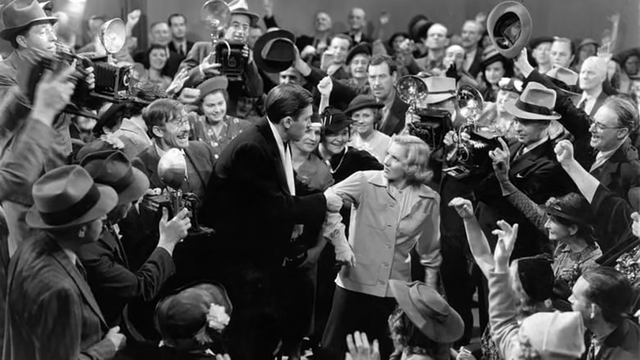
Another, perhaps lesser director – Leo McCarey, say, or Mitchell Leisen – would have gloried in the chaos and turned up the absurdity, but this is where Capra marks the story with his unmistakable touch. Stuck together in the drunk tank, Kirby and Grandpa bring out the worst in each other, and the old man's affability breaks long enough for him to upbraid the banker for his failings as a man and a father: "When your time comes, I doubt if a single tear will be shed over you. The world will probably cry, 'Good riddance.' That's a nice prospect, Mr. Kirby. I hope you'll enjoy it. I hope you'll get some comfort out of all this coin you've been sweating over then!"
It's the kind of moral declaration you'll find at the dramatic high point of the director's most famous films – classic "Capra-corn", packed with catharsis and designed to draw together every strand of audience sympathy that the film has been painstakingly collecting and drag them to whatever social or political high ground Capra has prepared. I used to be as caught up in this as any of the millions of fans of Capra's films, and still get a charge when Kirby, the rapacious monopolist and war profiteer, begins to crumble under the blast of Grandpa's rage.
One of my friend Kathy Shaidle's favorite unpopular opinions was that the real villain of Capra's It's a Wonderful Life (a flop when it was released but now his best loved picture) isn't Lionel Barrymore's grasping Mr. Potter but Thomas Mitchell's bumbling, oafish Uncle Billy. She wrote here that "when I see ditzy Uncle Billy – who has no business working at the savings and loan George Bailey supposedly cares so much about – accidentally slip that $8000 to Mr. Potter (over $100,000 in today's money) I break out in hives (and want to reach through the screen and punch him)".
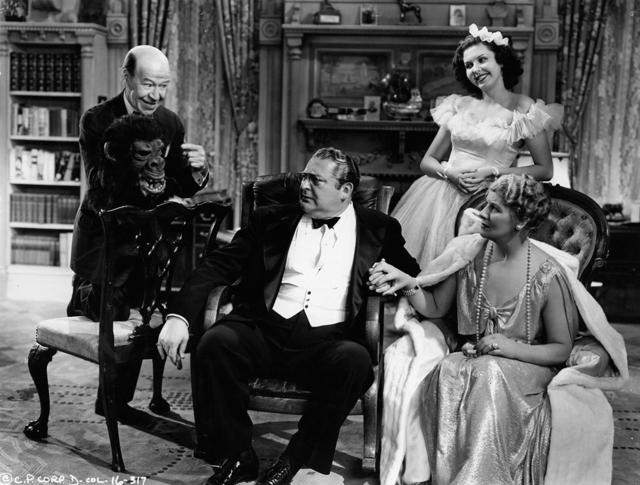
It was just one of several things that bothered her about the film – though not enough to stop her watching it every year. Similarly I wonder why no one ever talks about how annoying it would be to live next to the Vanderhof house on that street on the Upper West Side, full of self-obsessed oddballs pursuing their own muses loudly, punctuating every day with frequent bursts of fireworks. The charm would wear off pretty fast. And I can't forget how quickly Grandpa abandons his neighbours to imminent eviction when he sells out to Blakely for a quarter of his previous offer, just because he thinks Alice won't be coming home again.
We're able to use a term like "Capra-corn" today because the director laid out his worldview distinctly in three films that were, at least until It's a Wonderful Life acquired an audience over decades of TV screenings, considered his critical and commercial masterpieces. The titles are your first clue that Mr. Deeds Goes to Town and Mr. Smith Goes to Washington are basically the same film, echoed by the slightly darker Meet John Doe, the noir-esque picture he made for Warner Bros. when he was finally free of Harry Cohn and Columbia.
The villains of these films are plainly visible, and nobody will ever openly sympathize with cynical politicians, corrupt party bosses, scheming lawyers, dishonest journalists and manipulative newspaper publishers. And we all like to think that we're on the side of "the little people" or whatever more than slightly condescending term we use to describe that lumpen demographic we imagine we orbit at a respectful and comfortable distance.
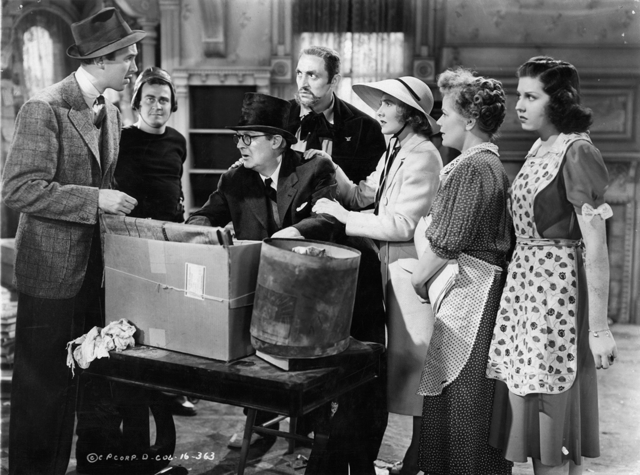
So we identify with the heroes of Capra's films, cheering when they rally at the last minute and overcome what looked like a fatal betrayal by their enemies. It wasn't just that Capra believed it, but that he knew that his audience needed to believe in justice and honesty and the triumph of Christian moral order at a time when disaster threatened their country and evil seemed to walk the earth in heavy leather boots.
We never doubt that Tony and Alice will be together, because there's no other satisfying conclusion to their story and, besides, they're young and attractive and that's how movies work. So our attention is drawn to Kirby, the "hero-villain" of You Can't Take It with You, who must be humiliated before stumbling toward redemption, when the monopolist and war profiteer recovers his soul and plays a duet with Grandpa on the harmonica, ending the picture absorbed into the clan of eccentrics.
I loved Capra's films when idealism felt like a virtue; maybe I might have loved them more if I hadn't spent my adult life in journalism, where I saw how cynical politicians, scheming lawyers, monopolists and war profiteers generally lacked shame and were only stopped from pursuing their destiny by either jail or bankruptcy. And that most people are happy to tolerate corrupt party bosses and dishonest journalists if they sail under the flag of whatever party or cause they support. The wonder isn't that Mr. Smith went to Washington, but that his optimism about the system even survived a brief brush with municipal politics.
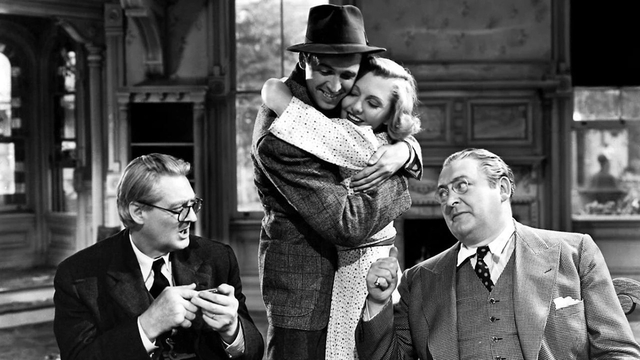
Capra won his third (and final) Oscar as best director for You Can't Take It with You, and Harry Cohn got his Oscar when the film won for best picture. The New York Times wrote that it would only disappoint "superficial admirers of the play" while the New Yorker preferred the original stage version.
Cohn and the studio knew they had a hit and the usually tight-fisted studio boss decided to splash out on an "international press preview", picking up the tab for, as Capra recalled, not just "the six hundred resident scribes and lensmen who inundated the world with 'news' from Hollywood's publicity mills" but "several hundred personally invited pundits, sages and critics from this county and abroad – Columbia picking up the tabs."
On his way to the studio for the media preview, Capra and his wife dropped off their three-year-old son Johnny at the hospital for a tonsillectomy. Pulling up to the studio gate he was told to turn around and rush back to the hospital, where he learned that their son had died suddenly of a blood clot in his brain. Driving home he passed the studio again. "The crowds, police and banners were still there. Somehow they didn't mean much now."
Club members can let Rick know what they think by logging in and sharing in the comments below, as access to the comments section is one of many benefits that comes along with membership in the Mark Steyn Club.
